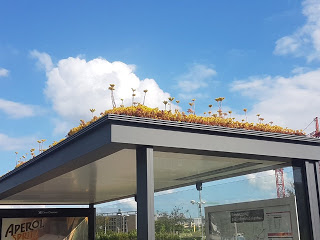The roofs of hundreds of bus stops have been covered in plants as a gift to honeybee, by a city in the Netherlands. Mainly made up of sedum plants, a total of 316 have been covered in greenery in Utrecht. The shelters not only support the city’s biodiversity, such as honey bees and bumblebees, but they also help capture fine dust and store rainwater. The roofs are looked after by workers who drive around in electric vehicles, and the bus stops have all been fitted with energy-efficient LED lights and bamboo benches. The electricity used to power the buses will come directly from Dutch windmills. Utrecht also runs a scheme which allows residents to apply for funding to transform their own roofs into green roofs. Physics-Astronomy Holland Covers Hundreds of Bus Stops with Plants as Gift
Topics:
Mike Norman considers the following as important:
This could be interesting, too:
Robert Vienneau writes Austrian Capital Theory And Triple-Switching In The Corn-Tractor Model
Mike Norman writes The Accursed Tariffs — NeilW
Mike Norman writes IRS has agreed to share migrants’ tax information with ICE
Mike Norman writes Trump’s “Liberation Day”: Another PR Gag, or Global Reorientation Turning Point? — Simplicius
The roofs of hundreds of bus stops have been covered in plants as a gift to honeybee, by a city in the Netherlands. Mainly made up of sedum plants, a total of 316 have been covered in greenery in Utrecht.
The shelters not only support the city’s biodiversity, such as honey bees and bumblebees, but they also help capture fine dust and store rainwater. The roofs are looked after by workers who drive around in electric vehicles, and the bus stops have all been fitted with energy-efficient LED lights and bamboo benches.
The electricity used to power the buses will come directly from Dutch windmills. Utrecht also runs a scheme which allows residents to apply for funding to transform their own roofs into green roofs.
Physics-Astronomy
Holland Covers Hundreds of Bus Stops with Plants as Gift to Honeybees

